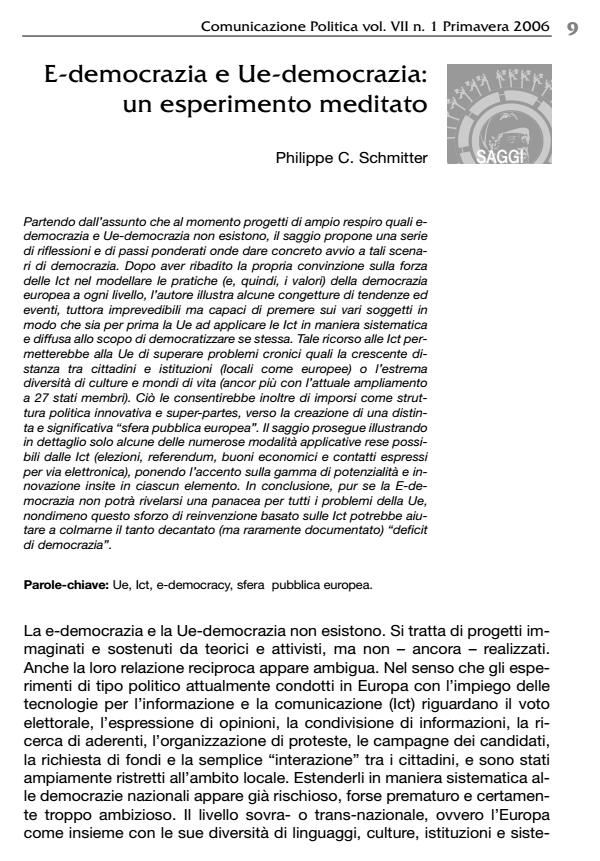E-democrazia: un esperimento meditato
Titolo Rivista COMUNICAZIONE POLITICA
Autori/Curatori Philippe C. Schmitter
Anno di pubblicazione 2006 Fascicolo 2006/1
Lingua Italiano Numero pagine 17 P. 9-25 Dimensione file 94 KB
DOI
Il DOI è il codice a barre della proprietà intellettuale: per saperne di più
clicca qui
Qui sotto puoi vedere in anteprima la prima pagina di questo articolo.
Se questo articolo ti interessa, lo puoi acquistare (e scaricare in formato pdf) seguendo le facili indicazioni per acquistare il download credit. Acquista Download Credits per scaricare questo Articolo in formato PDF

FrancoAngeli è membro della Publishers International Linking Association, Inc (PILA)associazione indipendente e non profit per facilitare (attraverso i servizi tecnologici implementati da CrossRef.org) l’accesso degli studiosi ai contenuti digitali nelle pubblicazioni professionali e scientifiche
Moving from the assumption that currently neither e-democracy nor Eu-democracy exists, this paper provides a series of careful ideas and actual steps aimed to implement such democratic perspectives. Strong advocate of Ict’s powerful force in shaping the practices (and, eventually, the values) of democracy in Europe at any level, the author outlines some conjunctures of trends and events that, although yet unforeseeable, could compel the Eu actors to apply Ict in a systematic and comprehensive fashion to the task of democratizing itself. This widespread use of Ict could allow the Eu to overcome chronical problems, such as the growing distance between citizens and institutions (both at European and local levels), and the extreme diversity of cultures and life-worlds (even more with the current expansion to 27 member states). It will also help the Eu to extert itself as an innovative and super-partes political structure, moving toward the creation of a distinctive and significant European public sphere. The essay then proceeds to outline in detail only some of the many Ict applications (voting, referendum, vouchers and contacts all pursued via electronic means), underlining the great level of potentiality and innovations inherent to all these features. In conclusion, even if E-democracy will not be a panacea for Eu-democracy, nevertheless this effort aimed to re-invent itself through the Ict will be helpful in filling up its much decried (but rarely proven) democracy deficit.
Philippe C. Schmitter, E-democrazia: un esperimento meditato in "COMUNICAZIONE POLITICA" 1/2006, pp 9-25, DOI: